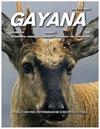智利海燕湿地Coscoroba Coscoroba和Cygnus melancoryphus的生境偏好及其保护意义
IF 0.4
4区 生物学
Q3 Agricultural and Biological Sciences
引用次数: 0
摘要
湿地是具有高度多样性和全球重要性的环境,因为它们提供生态系统服务。在智利,大部分湿地都受到威胁,包括鸟类,尤其是两只南半球天鹅(Coscoroba Coscoroba和Cygnus melancoryphus)。在这里,我们对海燕湿地中这两种物种的丰度进行了三年的监测。结果表明,海燕湿地是南美天鹅种群保护的重要场所,coscoroba和C. melancoryphus的丰度平均值分别为38.5 ±18.8和11.6 ±12.4(峰值为40 ind)。这些天鹅避开靠近城市地区的地方,并倾向于远离人类活动的栖息地。天鹅的探测概率受最低气温、最高气温和风速的影响。水生植物和河流是影响天鹅数量的关键因素。我们的大规模监测凸显了海燕湿地对南天鹅保护的重要性,并为南天鹅的丰度格局以及C. coscoroba和C. melancoryphus的种群动态提供了有价值的信息。这些数据支持了为这片湿地制定保护和管理计划的必要性。本文章由计算机程序翻译,如有差异,请以英文原文为准。
Habitat preference and abundance of Coscoroba coscoroba and Cygnus melancoryphus in Petrel wetland (O'Higgins region, Chile): Implications in the conservation
Wetlands are environments with a high diversity and global importance due to the ecosystem services they provide. In Chile, most wetlands are threatened, including their avifauna, especially the two southern hemisphere swans (Coscoroba coscoroba and Cygnus melancoryphus). Here, we made three years of monitoring of abundance of both species in the Petrel wetland. Our results show that the Petrel wetland is an important site for the conservation of South American swan populations, with an abundance average of 38.5 ± 18.8 individuals of C. coscoroba (peak of 60 ind.) and 11.6 ± 12.4 individuals of C. melancoryphus (peak of 40 ind.). These swan species avoid sites close to urban areas and show a preference for habitats distant from anthropogenic activities. The detection probability of swans was influenced by minimum and maximum temperature and wind speed. The vegetation aquatic and riverine are key variables to the abundance of these swans. Our large monitoring highlights the importance of Petrel wetland for the conservation of southern swans and provide value information about their abundance patterns and the population dynamics of C. coscoroba and C. melancoryphus. These data support the need to develop conservation and management plans for this wetland.
求助全文
通过发布文献求助,成功后即可免费获取论文全文。
去求助
来源期刊

Gayana
ZOOLOGY-
CiteScore
1.30
自引率
0.00%
发文量
5
审稿时长
>12 weeks
期刊介绍:
GAYANA is a scientific journal published by Universidad de Concepción, Chile. It is the modern version of Gayana Oceanología and Gayana Zoología. Therefore its numeration starts at volume 63(1).
GAYANA covers all aspects of zoology and oceanographic research. It is structured in five sections, defined by subject or discipline: Ecology, Biodiversity and Taxonomy, Earth Sciences, Evolutionary, and Applied Biology and Environmental Biology. Each section is in charge of an editor who receives and manages the manuscripts sent for evaluation in close collaboration with the editorial board.
 求助内容:
求助内容: 应助结果提醒方式:
应助结果提醒方式:


